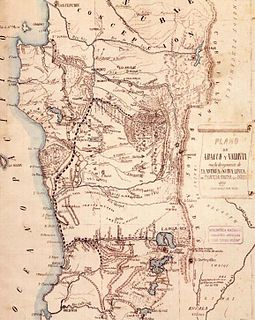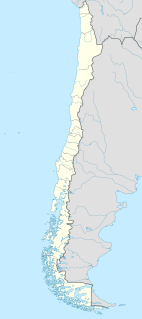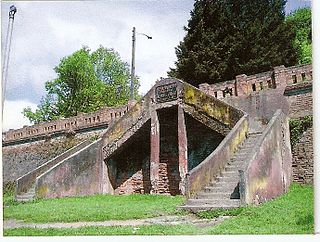| Putaendo River | |
|---|---|
| Country | Chile |
The Putaendo River is a river of Chile.

Los Ángeles is the capital of the province of Bío Bío, in the commune of the same name, in Bío Bío, in the center-south of Chile. It is located between the Laja and Biobío rivers. The population is 186,671 inhabitants. The municipality ("comuna") of Los Ángeles has the highest absolute rural population of any Chilean municipality.

Araucanía or Araucana was the Spanish name given to the region of Chile inhabited by the Mapuche peoples known as the Moluche in the 18th century. Prior to the Spanish conquest of Chile, the lands of the Moluche lay between the Itata River and Toltén River. Following the great rising of the Moluche and Huilliche after the Battle of Curalaba in 1598 during the Arauco War, the Spanish were expelled from south of the Bío-Bío River. After many decades of further warfare, the bounds of Araucania were recognized by the Spanish as being between the Bío-Bío River and Toltén River. This old region of Araucanía now is divided between the southern part of the Bío-Bío Region and the Araucanía Region, in southern Chile.

The Biobío River is the second largest river in Chile. It originates from Icalma and Galletué lakes in the Andes and flows 380 km to the Gulf of Arauco on the Pacific Ocean.
Biobío or Bío-Bío may refer to several places in Chile:

The Arauco War was a long-running conflict between colonial Spaniards and the Mapuche people, mostly fought in the Araucanía. The conflict begun at first as a reaction to the Spanish conquest attempt establishing cities and forcing Mapuches into unfree labour. It subsequently evolved over time into phases of low intensity warfare, drawn-out sieges, slave-hunting expeditions, pillaging raids, punitive expeditions and renewed Spanish attempts to secure lost territories.

Laja River is a river in Chile, along which can be found the Laja Falls. It is located in the Bío Bío Region. The source of the river is Laguna del Laja in the Andes, then flows westward through the Chilean Central Valley and terminates into the Bío Bío River, being an important tributary of it.

Mulchén is a city and commune in Bío Bío Province of Bío Bío Region, Chile. It was first settled in 1871 by soldiers during the so-called Pacification of the Araucania. In 1875 Mulchén was officially founded.

The Itata River flows in the Bío Bío Region, southern Chile.

The Chilean Coastal Range is a mountain range that runs from north to south along the Pacific coast of South America parallel to the Andean Mountains, extending from Morro de Arica in the north to Taitao Peninsula, where it ends at the Chile Triple Junction, in the south. The range has a strong influence on the climate of Chile since it produces a rain shadow to the east. Because of this the vegetation growing on the seaward slopes is much more exuberant than in the interior. Compared to the coastal lowlands and the Intermediate Depression it is sparsely populated with land use varying from protected areas to grazing and silviculture. The range is present in all Chilean regions except for Coquimbo Region and Magallanes Region.

The Occupation of Araucanía or Pacification of Araucanía (1861–1883) was a series of military campaigns, agreements and penetrations by the Chilean army and settlers into Mapuche territory which led to the incorporation of Araucanía into Chilean national territory. Pacification of Araucanía was the expression used by the Chilean authorities for this process.

Nacimiento is a Chilean city situated in the Bío Bío Province, Bío Bío Region, 550 km (342 mi) south of Santiago, and 104 km (65 mi) from the closest major city in the region, Concepción.

The Zona Sur is one of the five natural regions on which CORFO divided continental Chile in 1950. Its northern border is formed by the Bío-Bío River, the limit with the Central Chile Zone. By west with the Pacific Ocean, by the east with the Andean mountains and Argentina. Its southern border is the Chacao Channel, beyond it lies the Austral Zone. While Chiloé Archipelago belongs geographically to Zona Austral in terms of culture and history it lies closer to Zona Sur.
The Conquest of Chile is a period in Chilean historiography that starts with the arrival of Pedro de Valdivia to Chile in 1541 and ends with the death of Martín García Óñez de Loyola in the Battle of Curalaba in 1598, and the destruction of the Seven Cities in 1600 in the Araucanía region.
Aillarehue or Ayllarehue ; a confederation of rehues or family-based units (lof) that dominated a region or province. It was the old administrative and territorial division of the Mapuche, Huilliche and the extinct Picunche people. Aillarehue acted as a unit only on special festive, religious, political and especial military occasions. Several aillarehues formed the Butalmapu, the largest military and political organization of the Mapuche.
Guaqui or Guaque River is a tributary of the Bío Bío River in the Bío Bío Region of Chile. It is a river of great volume with a course of 55 kilometers originating from small streams, that have their source west of the town of Las Canteras; it runs to the west, north of the city of Los Ángeles, and it empties on the right bank of the Bio Bio, immediately south of the small town of Diuquin. Its major tributary is the Rarinco River. Near its mouth was the site of the old fort Santo Arbol de la Cruz. Guaqui, is a derivative of the Mapudungun guaqueñ, "murmur".
Butalmapu or Fütalmapu is the name in Mapudungun for "great land", which were one of the great confederations wherein the Mapuche people organized themselves in case of war. These confederations corresponded to the great geographic areas inhabited by the Mapuches in Chile.

The Chol Chol River is a river in Chile. It is situated in the Araucania Region of Chile in the village of Cholchol, just outside Temuco and with the Cautín River are tributaries of the Imperial River (Chile).
The Pullinque River is a river of Chile.

Inca rule in Chile was brief; it lasted from the 1470s to the 1530s when the Inca Empire collapsed. The main settlements of the Inca Empire in Chile lay along the Aconcagua, Mapocho and Maipo rivers. Quillota in Aconcagua Valley was likely the Incas' foremost settlement. The bulk of the people conquered by the Incas in Central Chile were Diaguitas and part of the Promaucae.
| This article related to a river in Chile is a stub. You can help Wikipedia by expanding it. |